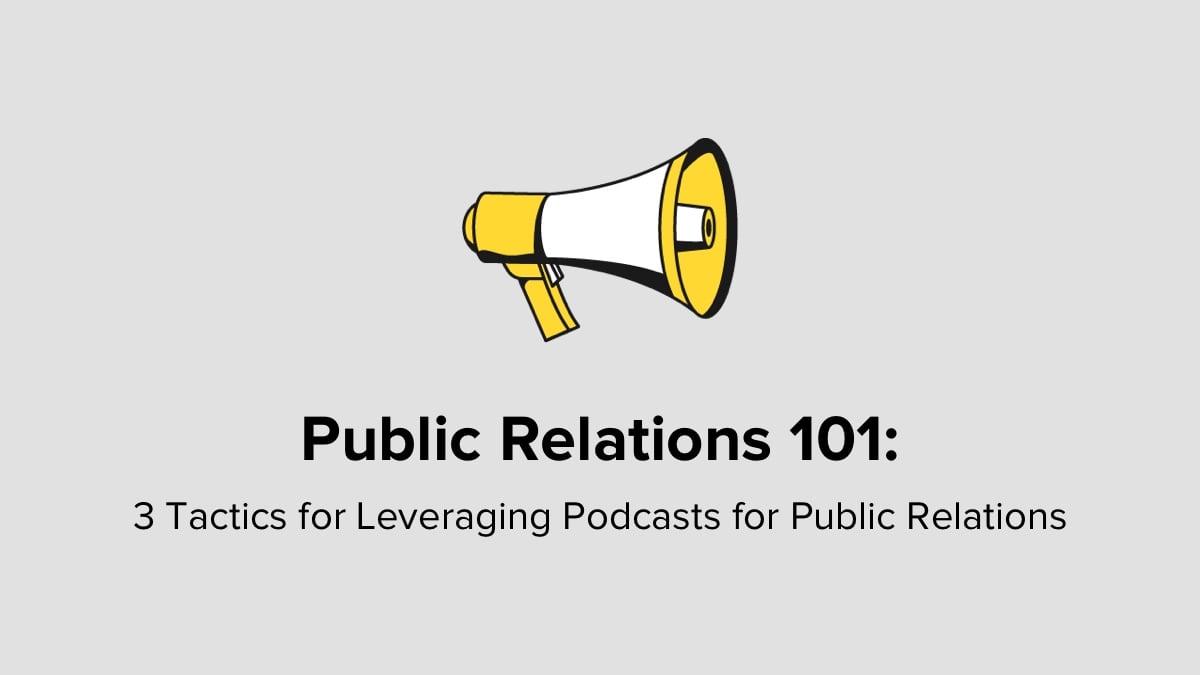PR 101: 3 Tactics for Leveraging Podcasts for Public Relations

Since its advent in 2004, podcasting has been steadily growing in popularity. In fact, Edison Research and Triton Digital found that the total number of people who have ever listened to a podcast surpassed 50% for the first time in 2019. Because of the growing number of podcast listeners, hosting and appearing on podcasts has become a common addition to many marketing and PR strategies as a means to reach a broader audience through more content channels.
However, when the coronavirus pandemic swept the globe, no one was quite sure how podcasting would fare. Would people still listen to podcasts without the ample podcast-listening time of their commute?
The answer appears to be yes, according to Spotify’s Q1 2020 shareholder letter. Though morning routines changed (largely due to the lack of commuting), listening to podcasts during other activities increased, such as cooking, doing chores, spending time with family, and relaxing at home. By the end of July, active monthly users were consuming more than double the podcast content compared to pre-pandemic levels.
How Can You Get Your Expert in the Podcast Game?
With podcasts thriving during this pandemic, there’s never been a better time to add it to your PR program. Here are five best practices to help you get started:
Before You Begin
Find a podcast that best suits your intended audience.
Everyone wants to be on a hot podcast such as 'How I Built This'. This NPR podcast has almost 300 episodes and features guests from companies such as Wikipedia, Airbnb, Ben & Jerry’s, Buzzfeed, and more. But unless your expert is the founder of a well-known company, it might be difficult to make it onto this show. While 'How I Built This' has a large audience and is an instantly recognizable show, it may not actually be the best fit for your company or client. Consider smaller and more niche shows that may not only be easier to appear on, but may offer a greater impact for your audience. For instance, podcasts that speak directly to finance leaders in need of a new automation solution or real estate leaders looking for home energy insights could get your expert in front of the very leaders who need those solutions.
Research the type of guest the podcast wants.
Just because a podcast reaches your intended audience doesn’t mean it’ll accept your expert as a guest. Some podcasts don’t interview guests as part of their show, while others only interview guests in certain roles (such as a CEO, CSO, etc.). Sometimes you can identify the type of guest typical to the podcast just by reading the description or episode titles, but the best way to get a feel for the podcast is to listen to a few episodes. This will also give you a better idea about the host’s interview style and go-to topics, which you can then leverage in your pitch.
3 PR Tactics for Podcasts
1.) Invest time in crafting a unique pitch.
Just like any other media opportunity, you’ll want to cater your pitch specifically to the podcast you are pitching. Now that you’ve listened to a few episodes and have a sense of the topics the host is most likely to cover, determine the achievements and experience of your expert that you most want to highlight. It’s best to share a tailored bio including responsibilities in their current role, relevant past roles or speaking engagements, and projects or other achievements that this niche audience will care about. You’ll also want to list off a few topics the SME is willing to discuss on the podcast.
2.) Help your expert create an optimal podcast recording space.
Congrats! Your pitch captured the attention of the host and they have invited your expert to be a guest. To ensure a high-quality podcast recording, advise your expert to set up in a quiet room, silence their phone, and snooze any other notifications that might interrupt the interview. You’ll also want to make sure they have the proper equipment. While some podcasts allow calling in from a phone or using a computer microphone, others require a professional-grade microphone and headphones for the clearest and most crisp audio. If your expert doesn’t have this equipment, the next best option would be noise-canceling headphones with a microphone attached.
3.) Get your expert excited about the interview.
Most podcast recordings are recorded live-to-tape, meaning the host will record the conversation and then edit it into a podcast episode. Ahead of the interview, let the expert know that they can pause or restart their talking points if they make a mistake or stumble over a word or explanation. Most hosts are hoping to steer the conversation in a direction that produces the best possible episode. This means they will want to avoid awkward “gotcha” moments; they are successful if they shine a positive light on their guest. Another great tip to share with your expert is to smile and make facial expressions even though the audience can’t see them. This will make their voice more expressive and help them convey excitement.
________
Podcasts can be a potent target for thought leadership. The sooner you add it to your PR strategy, the sooner you can reach more of your targeted audience and help your expert build a repertoire of episodes that you can point to for more lucrative podcasting opportunities. Who knows, maybe someday you’ll even get that expert on a big-time podcast like 'How I Built This'.
Speaking of podcasts, check out our podcast, Coffee with a Journalist, where we sit down with your favorite journalists from publications including Forbes, The New York Times, and The Wall Street Journal!
Want more blogs like this?
Fill out the form below to subscribe to our newsletter and receive emails with the top blogs from The TypeBar!
